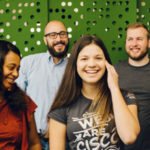You never know when life will throw you a curveball. Two and a half years ago, I had just started a new role at Cisco and was getting off a plane in Denver, Colorado to meet my new team at an offsite. It was a time of change and excitement.
There was just one inconvenient concern. Before the trip, I had experienced vision problems in my right eye — first blurriness, then double vision. A visit to the optometrist had proven inconclusive.
According to the optometrist, I had 20/20 vision and was fine. I wasn’t convinced.
I pushed for the optometrist to let me see an ophthalmologist, who did a more thorough evaluation and recommended an MRI. But there was no time to schedule the MRI before my trip to Colorado.
I Didn’t See It Coming
Once I landed in Denver, full of excitement for my first offsite with my team, my vision suddenly got worse – I couldn’t even see in front of me.
I knew at once something was seriously wrong and headed straight to the ER. The doctor suspected neurological damage — caused by either a tumor or multiple sclerosis (MS).
It was in that Denver ER that I was diagnosed with MS and my life changed forever.
The Cisco Family Steps Up
Initially, I thought I could finish the offsite, but the ER doctor sent me to see a neurologist in my hometown of San Jose. When I messaged my new manager to say I couldn’t attend the offsite, not knowing what to expect – I got my first taste of the incredible support my Cisco family would give in the ensuing months.
My new manager dropped everything and showed up at the ER with her fiancé and a bag filled with snacks.
That support continued back in San Jose. A fellow employee who had been diagnosed with MS years earlier gave me invaluable advice. A former team member sent out an email offering support, copying directors and vice presidents on the message.
Later, I also met Cisco’s Crystal Hawks, Executive Communications Manager, who also teaches meditation and yoga to people in 12-step addiction recovery programs. Crystal encouraged me to share my story further after recently writing her “We Are Cisco” story about homelessness.
Seeing the selfless support from my Cisco family and my own family was tremendously comforting at that time. I’m pleased to say I’ve continued working at Cisco since my diagnosis.
The Mindfulness Factor
Many people living with MS have found their quality of life enhanced by factors such as diet, exercise, and healthy behaviors and relationships. Spiritual, mental, and emotional well-being have also proved to be essential.
MS is an unpredictable, often disabling disease of the central nervous system that disrupts the flow of information within the brain, and between the mind and body.
In particular, it attacks what’s called the myelin sheath, a protective layer that surrounds nerve fibers. It’s like when your cellphone cord gets damaged — it can lead to faulty signals that result in optic or mobility issues.
My diagnosis has driven me to do a better job of managing my mental health, cardiovascular health and stress. In particular, I’ve found “mindfulness practices” such as meditation to be helpful.
Mindfulness can be as simple as pausing when taking a walk or before a meal. It’s about moment-to-moment awareness and the practice of being present. I still get caught up in stress at times, but there’s more awareness now. I don’t get sucked into the external elements as easily.

Rallying Behind Bike MS
I wasn’t going to let my diagnosis define me, and have since decided to volunteer and raise awareness and funds for research into MS.
I am co-captain of Cisco’s Bike MS team in San Jose and am trying to build ridership for the Sonoma Valley ride this September. The ride comprises loops of various distances — from 20 miles to 40, 80, and 100 miles. This is something all Cisco employees can help to support too!
You don’t even have to ride a bike to help. Volunteers can also raise funds as virtual cyclists or can help set up team tents and so on.
Even more so, the cause is close to Chuck’s heart. He has tweeted in support of Bike MS in the past.
An Invisible Disease
Although the cause of MS remains a mystery, much has been learned about the disease as well as treatment options. MS is different for everybody and does not always manifest in ways that are obvious or visible. Just because you’re not physically disabled doesn’t mean you’re not dealing with chronic issues such as fatigue, numbness, and brain fog.
That’s why it’s important to cultivate empathy with one’s peers. People suffering from MS, or other debilitating diseases, need to be able to share without fear of discrimination. For that, an environment of trust and understanding is key – and I know I’ve found that here at Cisco.
There’s a saying about how to handle unpredictable events: When life throws you a curveball, grab a bat and swing! I’ve been swinging since I got my diagnosis — and I’ve hit a couple of home runs.
I’ve been able to get a much better handle on aspects of my well-being that I previously neglected. In that sense, this diagnosis has been a blessing in disguise. A large part of that is thanks to the support I’ve received from family, friends, and my co-workers at Cisco.
Want to join a company that cares? We’re hiring. Apply now.
Want to volunteer with our Cisco Bike MS team? Please email bike_ms@cisco.com.


Peace and wellness to you Neyaz! #BeYouWithUs #WeAreCisco #LoveWhereYouWork
Such a compelling story, Neyaz. Thank you so much for sharing!
Thanks for sharing this, Neyaz. I'm sure it will help others. You and your team are inspiring!
Neyaz, what a beautiful story of strength and human caring.
It is heartwarming to hear what a caring community you have at Cisco.
And how mindfulness practices have helped your wellness so much, and you are being humble; you are now facilitating mindfulness for your coworkers.
Thank you for openly sharing your story!
Thank you Neyaz for your openness in sharing about your journey with MS! It has affected my family too and I am always overwhelmed by how supportive everyone at Cisco has been. I am so proud to work at this company with amazing people like you! #WeAreCisco
Neyaz – You are one of the strongest people I know! Your strength, grace and determination in the face of a daunting diagnosis inspires me. I'm so lucky to get to call you a friend and colleague!
Thank you for sharing this incredible story. It is very comforting to know your peers and company at all levels are at your side and supportive. My sister was just diagnosed with MS – she sells Real Estate in New Mexico with my father. In addition her husband owns a small construction company as she is very involved with both businesses. That has come to a halt as the MS has made it hard for her to get around, the pain is intense at times, and her brain fog is pretty severe. While they are independents and do not have the backing of a large company – it made me feel good to know Cisco has been there for you. I would love for Catalyst Labs to help fine a cure for MS to at least slow it down! Good Luck and than you Cisco! #CiscoRocks
Thank you for your story. I have raised money for MS for the past 8 years. Then, this past Christmas my Son was diagnosed with MS. He is looking at it as a chance to better his over all health. We don't think much about it until something like this happens. Thanks again for telling your story. Loved the support from our Cisco Team!!! They are the best!
Neyaz – you are amazing! Your strength and drive is truly admirable. I am so much better to have had the opportunity to work with you and now call you a friend. Thanks for sharing your story.
I am grateful to you for sharing your experience Neyaz. Thank you for helping the broader Cisco community understand how we can support MS research and how we can support colleagues facing chronic health challenges.
Go, Neyaz!!! Wonderful article! You look beautiful! Cheers!
Way to go, Neyaz! Keep it up and thank you for sharing your story. I've been doing the MS150 in New Bern, NC since 2008. MS greatly impacted my family (my mom). I'm very passionate about the MS150. Keep up the great work.
Thanks so much for sharing and inspiring us Neyaz!
Neyaz, this year will be my 34th year riding for MS. While I don't have a personal connection to the disease, I like to tell people that I have too many friends with MS. Over the years Cisco employees have been great about donating and getting their donations matched. If it is ok with you, I will add you to the names of people that I ride for. Hopefully some day we can meet up. #WeAreCisco #CrushMS
What a beautiful story! Always wishing you the best Neyaz. I agree that we do have a very special culture filled with trust and understanding. Good luck in your Bikeathons and keep up with the amazing attitude. 🙂
Thank you! Neyaz, for sharing your story. You are such an inspiration. I am so glad I have the opportunity to know and work with you. Keep swinging for the fences!
– Stori
Hello Neyaz, do you know how many lives you have touched by sharing your story? You sound like a remarkable young lady and if there is ever anything I can do to assist you please do not hesitate to reach out to me. I too am here in San Jose in building 10 on the 5th floor. Definitely stay positive; it is the way we continue to move forward.
Blessings,
Linda
Thank you for sharing this story. I know how much it means to read something like this and feel motivated both to help as well as knowing you are not alone. I too have MS. I was diagnosed almost 15 years ago and understand some of the challenges you are dealing with. I absolutely want to echo your sentiment about our Cisco family. I cant even begin to express how our Cisco family culture has been there for me. I have always said every company says their employees are like family. Here at Cisco it is true and a part of the quality of my life. I dont even consider it "my life with MS". Its my life as me. My life as part of a great group of people.
Thank you so much for your courage and for sharing your story!
So inspired by you and by Cisco’s support!
Thank you so much for sharing
Thanks so much for sharing and inspiring us Neyaz. I agree that we do have a very special culture is Cisco.
I am so proud to work at this company with amazing leaders and people like you!
Neyaz, Thank you for sharing your story. Your strength, courage and determination to make a difference with MS are inspiring. #ProudtobeCisco